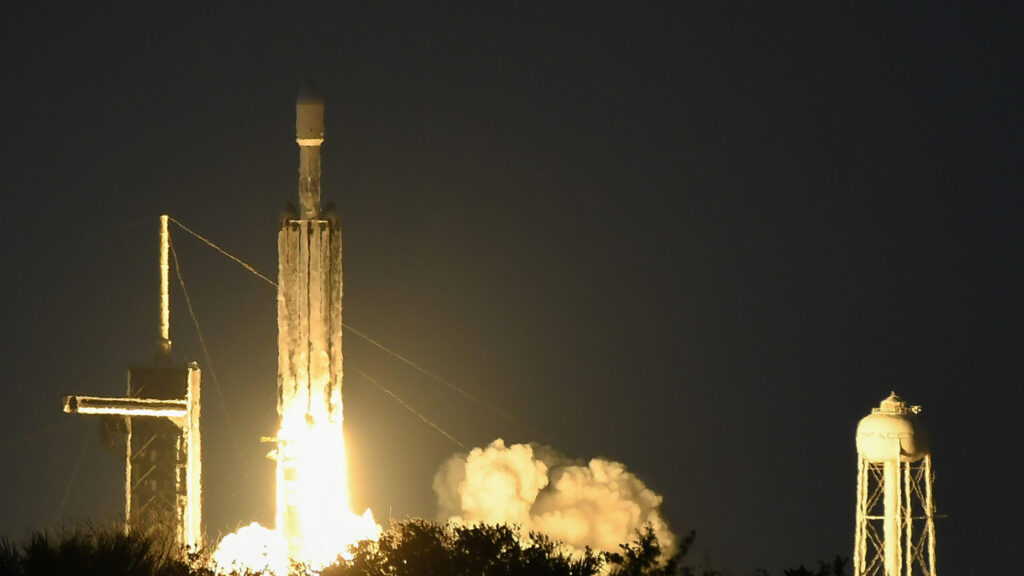
A SpaceX Falcon Heavy rocket launches on Jan. 15, 2023 from pad 39A at the Kennedy Space Center as seen from Cape Canaveral Space Force Station in Cape Canaveral.(Photo by Paul Hennessy/SOPA Images/LightRocket via Getty Images)
WASHINGTON — The United States led the world, far surpassing both China and Russia, in the number of space launches and satellites placed on orbit in 2023, according to a just-released study.
But rather than the US government it is one US company, billionaire Elon Musk’s SpaceX, responsible for that victory — a situation that is not new, but one that has been exacerbated since 2019 and the firm’s first launch for its Starlink mega-constellation to provide global internet access.
The numbers capture a number of key trends, including Russia’s failure “to keep up with evolving launch capabilities by the other space powers,” said Victoria Samson, head Secure World Foundation’s Washington Office.
“It also highlights how much SpaceX dominates the US launch market now. This is part of a larger trend where commercial launches are generally speaking overtaking the launch market,” she added. “We have over half the launch attempts being done by commercial actors; again, a big shift in space players.”
And while the Defense Department and the Space Force have welcomed the surge in commercial launch capacity because of the attendant reduction in costs to orbit, the current US dependency on the ever-more controversial Musk has increasingly raised concerns within the national security space community.
In his annual report on global Space Activities for 2023 [PDF], astronomer and astrophysicist Jonathan McDowell calculates that there were a record 223 attempted space launches world wide in 2023, up from 186 in 2022, and more than double the 85 attempts made in 2016.
The number of satellites successfully orbited in 2023 also hit a record high at 2,917, versus 2,485 in 2022 and only 216 in 2016. Only 66 of those birds are owned and/or operated by militaries, and to no space watcher’s surprise, the vast bulk were commercial, the report finds.
The total number of “cataloged” objects in space — that is, those bigger than 10 centimeters in diameter that can be traced to an owner — including both active payloads and dangerous space junk also jumped to 27,896 in 2023, up from 26,623 in 2022 and 18,525 in 2016.
McDowell, whose day job is at the Harvard–Smithsonian Center for Astrophysics, based his analysis on open-sources, including US Space Command’s Space-Track.org website that is populated by sanitized observational data about objects on orbit generated by the Space Surveillance Network operated by the Space Force’s18th Space Defense Squadron. Other sources include the not-for-profit Celestrak and the United Nations registry of space objects, among others.
US Leads — Thanks To SpaceX
Of those launch attempts, the US was responsible for 109, China 67, and Russia 19. Perhaps as interesting, India for the first time out-launched Europe — seven to three. North Korea also set a self-record with three launch attempts, after abandoning its efforts following a launch in 2016.
Of course, not all launches are successes. Of the 223 attempts, McDowell found that 212 rockets got their payloads into orbit. The US accounted for five failures; China, one; and North Korea, two. Both Russia, Europe and India all managed to ace their launches.
The report further breaks down global launch attempts by category: government, commercial launches contracted by governments, commercial launches carrying government payloads and purely commercial launches. Commercial launches globally far outpace governmental ones. The report states: “78 were carried out by governments; 11 by commercial companies under contract to their host governments, and 134 by commercial companies for commercial customers, including foreign governments.”
However, the most stunning statistic coming out of this section of the report is that world wide, SpaceX alone accounts for 98 of the launch attempts, with the mid-sized Falcon 9 rocket alone accounting for 91 of those. Doing the math, that means without SpaceX, the US would have launched only 11 rockets rather than 109 — vice China’s 67.
The US also accounted for far and away the most satellites successfully put in their planned orbits last year, across all the operational regions of space, the report shows. The count: US, 2,234; China, 213; Russia, 67; and Europe, 253. India accounted for nine, and North Korea, one.
But again, the bulk of those satellites worldwide belong to SpaceX’s Starlkink internet constellation in low Earth orbit. The company put a total of 1,937 Starlinks on orbit in 2023, McDowell’s calculations show.








